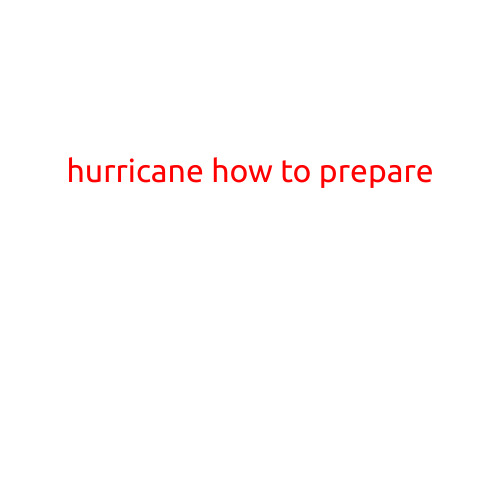
Hurricane How to Prepare: A Comprehensive Guide to Protecting Your Home and Family
As the Atlantic hurricane season approaches, it’s essential to prepare yourself, your home, and your family for the possibility of a hurricane making landfall. Hurricanes can cause catastrophic damage, flooding, and power outages, making it crucial to take proactive steps to ensure your safety and well-being. In this article, we’ll provide you with a comprehensive guide on how to prepare for a hurricane, including tips on securing your home, creating an emergency kit, and staying informed.
I. Securing Your Home
- Board up windows: Install plywood or hurricane shutters to prevent shattered glass from causing further damage.
- Trim trees and shrubs: Cut back branches to minimize damage from wind-borne debris.
- Anchor outdoor furniture and decorations: Secure loose objects, such as patio furniture, grills, and potted plants, to prevent them from becoming projectiles.
- Cover outdoor plumbing: Disconnect and drain outdoor hoses, and consider covering or wrapping outdoor plumbing fixtures to prevent damage.
- Gutter maintenance: Clean and clear your gutters to ensure proper water flow and prevent water accumulation.
II. Creating an Emergency Kit
- Water: Stock up on at least 1 gallon per person per day for drinking, cooking, and hygiene.
- Non-perishable food: Store canned goods, energy bars, and MREs to sustain your family for at least 3 days.
- First aid kit: Assemble a kit with essential medications, bandages, and antiseptic wipes.
- Flashlights and batteries: Have a reliable source of light and extra batteries.
- Cash and important documents: Keep cash, important documents, and valuables in a waterproof container.
III. Staying Informed
- Stay tuned to local news: Monitor local news and weather reports for updates on the storm’s trajectory and intensity.
- Sign up for emergency alerts: Register for emergency alerts from your local government or weather service to receive timely updates and instructions.
- Prepare your phone: Charge your phone and consider purchasing a backup power source, such as a portable charger or solar-powered charger.
- Stay informed through social media: Follow your local emergency management agency and other trusted sources on social media to stay up-to-date on the latest information.
IV. Evacuation Planning
- Have an evacuation plan: Identify escape routes and a meeting point in case you get separated.
- Pack an emergency kit: Make sure you have the necessary supplies, such as food, water, and medication, in case you need to evacuate.
- Stay calm and follow instructions: In the event of an evacuation, remain calm and follow the instructions of local authorities.
V. Post-Storm Precautions
- Wait for the all-clear: Do not return home until authorities have given the all-clear and it is safe to do so.
- Be cautious of debris and hazards: Wear protective gear, such as gloves and a mask, when cleaning up and clearing debris.
- Check for damage and repair: Inspect your home for damage and repair any broken windows, doors, or roofs as soon as possible.
By following these steps, you can help protect your home and family from the dangers of a hurricane. Remember to stay informed, prepared, and vigilant, and you’ll be better equipped to weather the storm and recover quickly afterward.





